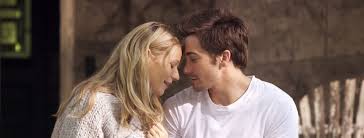Eye For Film >> Movies >> Proof (2005) Film Review

As Proof opens, the camera begins in a garden, heavy rain falling on leaves. It forces us inside through thick windows partially opaqued by the downpour, then lingers on Catherine's face, reclining, emotionally drained, yet at peace with herself. She is a devoted and introspective daughter of troubled mathematical genius Robert (Anthony Hopkins). As opening credits continue to roll, fast edits cut back and forth with scenes of bright, hectic activity. Catherine (Gwyneth Paltrow) awakens - it is as if from a reverie of a reverie - the audience catches up with a jolt, rapidly adjusting timeframes and perspective.
In complete contrast, Claire (Hope Davis), the extrovert, successful (though perhaps superficial) sister, lives in a normal, bustling world of business chic, respectably good clothes and jojoba shampoo. She hasn't paid a call on their ailing father for five years, yet discharged some filial duty by paying the mortgage on the house, where Catherine and Robert live, and seems incapable of expressing her true feelings. When eventually she comes to visit, we sense she wants to bridge a gulf and somehow bond with Catherine, but, instead of reaching out sincerely, she swamps her sister with niceness, bringing bagels and coffee, as if her Catherine "can't cope."

Later, at the party, following their father's funeral, an avant-garde rock band is playing a number called "i" which consists of a three minute silence. Most people slowly realise the strange appropriateness and bow their heads, but Claire giggles uncomfortably, missing the point entirely. Later, in the kitchen, she tries to keep Catherine's spirits up, maintaining an inane chatter about coffee being better in Manhattan, but the tone of her voice and inconsequentiality of the subject matter sounds reminiscent of the old man's deranged ramblings.
Robert hadn't been in full possession of his mind for several years but, when he dies, a startling manuscript comes to light, suggesting a mathematical breakthrough of international importance. Thrown into the already tense situation between Claire, Catherine and romantic interest Hal (Jake Gyllenhaal), it creates a pressure that shakes the very foundations of what is real in their relationships.
With a fine script, skilful direction and excellent characterisation, Proof provides Paltrow with her best role since Shakespeare In Love, showing she can do effective interiorisation and dark silences with the likes of Julianne Moore and Meryl Streep. Chameleon-like Gyllenhaal, having played mad (Donnie Darko), bad (Jarhead) and queer-as-they-come (Brokeback Mountain), now bares his chest as a convincing Lothario. Hopkins delivers majestically as the father pulled equally by genius and madness, characteristics Catherine leads us to believe may have been inherited. Claire's over-solicitous concern that her sister may be losing her mind starts to carry considerable New York worldly conviction. But is she?
All main characters are mathematicians. Catherine is fellow PhD student Hal's moral and intellectual superior, but she is so immured by inner contemplations and selfless devotion to her father that she is easy prey for his untested love, or Claire's well-meaning bullying. What proof do we, or should we, have in personal relationships?
In maths, proof can go beyond ordinary science, since science always needs to be revisited. Mathematics offers philosophical hope of absolutes, of shining rules upon which ordinary science can build. In the film, Catherine's devotion (as well as her genetic inheritance) seems to allow a channel for the unfathomable light of her father to flow. Her love is the catalyst for inherited mathematical insight and potential. While others gave him lip service, she has sweated through pages of theory with him, even in his infirmity. The finite means of proving her affection have not sufficed. No one now believes her. Will we?
A hypothesis, like a relationship, usually needs some work on it to know if it is durable, and Hal has to do the spadework on both, proving his affection for Catherine and testing the newly discovered mathematical proof (with help, of course). Just as proof needs to be tested on all sides, so the reclusive intellect has to be able to withstand the bright light of day if great mental leaps are to bear fruit. The ongoing reality checks that the main players force on each other not only provide a nerve-jangling subtext to this already full-bloodied drama, but also suggest the antagonistic forces used to test weaknesses in any hypothesis. Moral courage includes an endurance that can bring beneficial consequences and begs the question of why we should need proof at all, beyond some cerebral arrogance about being "right." The human benefit is still paramount.
Shakespeare In Love was director John Madden's crowd-pleasing romp, where intellectual metaphor was gaily and scintillatingly added. Proof is a challenging and substantial psychological drama, abounding with thoughtful symbolism, yet balanced with enough glitz to ensure success. See it with full concentration and the attendant emotional punch kicks in like a mule.
Proof adds up to a rich and unforgettable equation.
Reviewed on: 10 Feb 2006



















